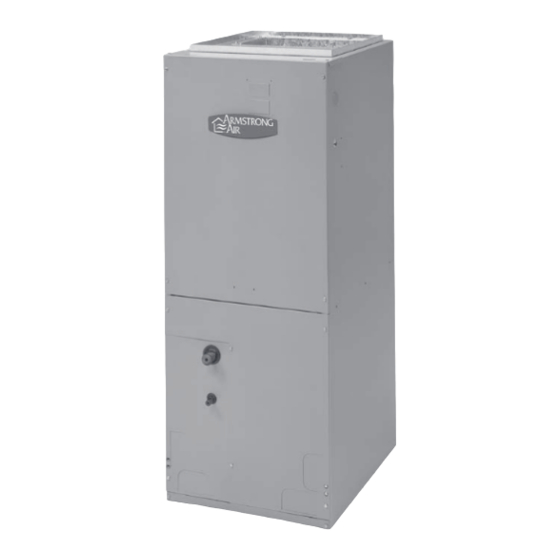Armstrong Air BCS2 Series Manuale di istruzioni per l'installazione - Pagina 12
Sfoglia online o scarica il pdf Manuale di istruzioni per l'installazione per Manipolatori d'aria Armstrong Air BCS2 Series. Armstrong Air BCS2 Series 15.

Complete Installation
NOTE: Refer to outdoor unit installation instructions for system
start-up instructions and refrigerant charging instructions.
PRE-Start Check
Is unit properly located, level, secure, and serviceable?
•
Has an auxiliary pan been provided under the unit with
•
separate drain for units installed above a finished ceiling
or in any installation where condensate overflow could
cause damage?
Have all webs been removed from the drain connections
•
that are being used? Have all drain pan plugs not used
been properly plugged?
Has the condensate line been properly sized, run,
•
trapped, pitched, and tested?
•
Is the ductwork correctly sized, run, taped, and
insulated?
•
Have all cabinet openings and wiring been sealed?
•
Is the indoor coil orifice size correct?
Have all unused orifice replacement parts and
•
packaging been disposed or?
•
Is the filter clean, in place, and of adequate size?
Is the wiring neat, correct, and in accordance with the
•
wiring diagram?
Is the unit properly grounded and protected (fused)?
•
Is the thermostat correctly wired and in a good location?
•
Are all access panels in place and secure?
•
Check Blower Operation
1.
Set the thermostat to FAN ON.
2.
The indoor blower should come on.
Check Electric Heater (if used)
1.
Set thermostat to call for auxiliary heat (approximately
0
5
F above ambient temperature). The indoor blower and
auxiliary heat should come on together. Allow a
minimum of 3 minutes for all sequencers to cycle on.
2.
Set the thermostat so it does not call for heat. Allow up
to 5 minutes for all sequencers to cycle off.
Check Airflow
Cooling blower speed
For proper cooling operation, the airflow through the
•
indoor coil should be between 350 and 450 CFM per ton
of cooling capacity (or 350 – 450 CFM per 12,000
BTU/HR) based on the rating of the outdoor unit.
•
The cooling blower speed is factory configured to
provide correct airflow for an outdoor unit that matches
the maximum cooling capacity rating of the air handler.
If the outdoor unit is smaller than the maximum cooling
•
capacity rating for the air handler, the cooling blower
speed may need to be changed. Refer to Blower
Performance Chart.
IMPORTANT: The cooling blower speed must be set to provide
a minimum of 350 CFM airflow per ton (1,200 BTU//HR) of
outdoor cooling capacity.
To change blower speed: Refer to "Wiring Diagram –
Electric Heat and Blower."
1.
Disconnect all power supplies
2.
Remove the air handler access panel.
3.
Locate pin number 2 on the blower relay. Two black
wires are connected to this terminal pin. One connects
to pin number 5 on the blower relay; one connects to an
inline splice connecting to a red or blue wire.
4.
Remove the wire going to the 4-pin blower motor
connector from the splice.
5.
Connect the blower lead (Red (LO), Black (HI)) onto the
splice from the 4-pin blower motor connector.
NOTE: Unused blower speeds are shipped
from the factory covered with a plastic cap.
Remove this cap from the new blower speed
terminal and replace it over the factory –set
blower terminal.
6.
Replace all panels
7.
Reconnect power.
12
